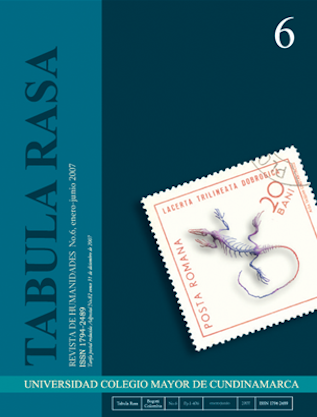Formation in Values: An Alternative to Constructing Citizenship
Formación en valores: una alternativa para construir ciudadania
Show authors biography
The brief historical journey that opens this article serves as a point of departure to address the subsequent issues, such as improving education of values, recuperate those values that are indispensable for the construction of citizenship, knowing and defending fundamental liberties of belief, expression, publication, association, manifestation and civilized protest, and the right of petition. Directives and coordinates of citizen formation are personal dignity, liberty and justice, among other values. Without loosing sight of the axiological models of the old continent, the article reflects about Latin-American ethnic thought and its immense possibilities for the construction of a new person with essentially human values, which is only achieved through education geared towards freedom, and development of ethical-moral potentialities that lead to a authentic formation; thus ethics and axiology in Latin America are enriched with relevant proposals by experts that aim for an education of values in accordance with the being and Latin-American idiosyncrasies.
Article visits 872 | PDF visits 654
Downloads
Amenemopet. 1976. «El hombre-los otros» en El derecho de ser hombre. Salamanca: UNESCOSígueme.Antolinez Camargo, Rafael. et al. 2002. Ética y educación. Bogotá: Mesa RedondaMagisterio.
Aristóteles. 1972. Moral. La gran moral a Eudemo. Madrid: Espasa-Calpe.
Aristóteles.1973. «Etica a Nicómaco» en Obras filosóficas. México: W. M. Jackson.
Azcárate, Patricio de. 1957. Platón: Diálogos escogidos. Apología de Sócrates. Buenos Aires: El Ateneo.
Carreras, Ll. et al. 1997. Cómo educar en valores. Madrid: Narcea.
Hersch, Jeanne y Gonzalo Arias Bonet. 1977. El derecho de ser hombre. Salamanca: UNESCO.
Grupo Areté y Hergué Editorial. 2002. «Educar en valores ¿es posible hoy, es necesario?», en Proyecto de formación en valores. http//www.hergue.com/felix/educar_en_valores.htm
Ishavasy-Upanishad. 1976. «El hombre-los otros», en El derecho de ser hombre. Salamanca: UNESCO-Sígueme.
Jaegger, Werner. 1985. Paideia. México: F.C.E. Mateo. 1965. «Sermón de las bienaventuranzas», en Nuevo Testamento. Buenos Aires: Sopena.
Ministerio de Educación Nacional. 2001. «Educación para vivir en sociedad», en Al tablero. Bogotá.
Ministerio de Educación Nacional. 2004. Estándares básicos de competencias ciudadanas. Formar para la ciudadanía sí es posible. Bogotá: Ascofade.
Mockus Sivikas, Antanas. 2001. Programa de gobierno visionario 2001-2003. Bogotá.
Platón. 1957. Diálogos escogidos. Apología de Sócrates. Buenos Aires: Editorial El Ateneo.
Rodríguez, Eudoro. 1994. Introducción a la filosofía. Bogotá: Usta.
Salazar Ramos, Roberto J. 1983. Filosofía contemporánea: esbozos y textos. Bogotá: Usta.
Subhasta-Ratnabhandagara. 1976. «El hombre-los otros», en El derecho de ser hombre. Salamanca: UNESCO-Sígueme.




